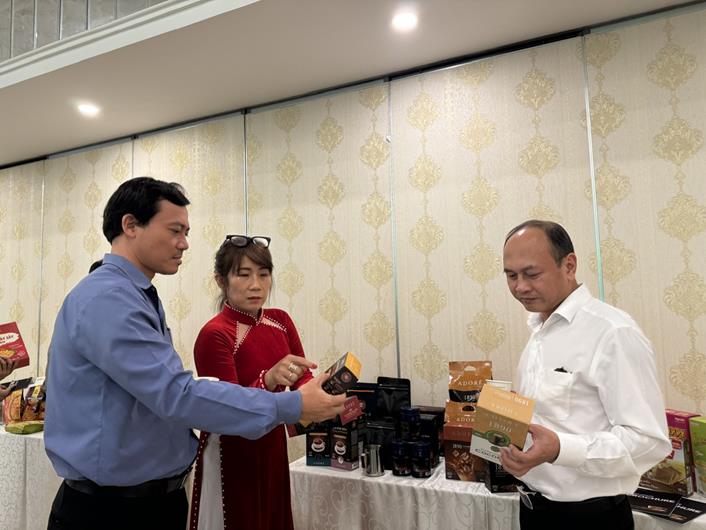(News Portal – Dong Nai) - With
approximately 1.94 billion people, accounting for a quarter of the global
population and forecasted to grow rapidly in the coming years, Islamic
countries represent a highly promising market for agricultural products. Viet Nam
holds several advantages for boosting agricultural exports to these markets due
to its strong diplomatic and trade relationships with Muslim countries.
Additionally, Viet Nam enjoys a geographic advantage, being close to populous
Halal markets such as Indonesia and Malaysia.
This emerging, high-potential market is now a key focus for Dong Nai's agricultural businesses and processors.
A Market of Business Interest
The world's most populous Islamic nations, including Indonesia, Malaysia, South Asia, Pakistan, and Bangladesh, have a significant demand for importing various Vietnamese agricultural products. Dong Nai's key agricultural exports, such as coffee, pepper, cashew nuts, fruits, vegetables, pork, chicken, and eggs, are well-suited for Halal markets. Many businesses in the province have already exported high-quality agricultural products to major markets like China, North Asia, Europe, and the United States and are now expanding into the global Halal market.

Dong Nai's Halal-certified agricultural products were showcased at a conference recently held in Bien Hoa City to connect Dong Nai's agricultural products with Halal markets. Photo: Song Le
According to a report from the Department of Agriculture and Rural Development, 25 businesses in the province have obtained Halal certifications and have exported products such as cashew nuts, pepper, dried fruits, dried vegetables, coconut jelly, rice flour, and more to markets like Malaysia, Indonesia, the Philippines, Turkey, Iran, and the Middle East. Dong Nai's business community has gained substantial experience exporting agricultural, forestry, and fishery products to Halal markets. Notably, many businesses have successfully exported Halal-certified agricultural products to countries with stringent standards such as the United States, Europe, and Japan. These favorable conditions pave the way for Dong Nai's agricultural products to expand further into Halal markets.
According to some businesses that have exported agricultural products to Halal markets in the province, Halal-certified products meet criteria for food safety, health assurance, quality, cleanliness, ethical production, and environmental protection. As a result, Halal-certified products not only perform well in export markets but are also increasingly favored by domestic consumers seeking high-quality goods.
Supporting Businesses to Enhance Exports
Businesses exporting agricultural products to Halal markets have identified challenges in accessing this new market, including a lack of specialized promotional activities for Halal markets and insufficient trade promotion initiatives connecting businesses directly with partners in these markets.
Specifically, businesses face a lack of information and knowledge about the market and the unique religious practices of Muslims. The Halal standards for products and services are not internationally or regionally uniform, with each country having its own requirements for Halal certification for imports and domestic production, posing a significant barrier. Additionally, the costs associated with investing in equipment, production lines, and safe raw materials for Halal standards – covering packaging, transportation, and preservation – are typically higher than for regular products. This is particularly challenging for small and medium-sized Vietnamese enterprises, which often face capital limitations.
Mr. Tran Van Tan Cuong, Director of Viet Nam National Halal Company Limited (Ho Chi Minh City), noted that the Halal market remains highly promising. Since the beginning of the year, Viet Nam's ministries and agencies have organized numerous seminars, trade promotion programs, and tourism promotion activities related to Islam to boost the export of Vietnam's Halal products. “Islam may seem mysterious at first, but upon interaction and understanding, it becomes clear that it is a religion with distinct beliefs and culture. To penetrate the Islamic market effectively, businesses must not only understand the market but also the culture, preferences, and needs of Muslim consumers," he emphasized.
Dong Nai is also paying significant attention and creating favorable policies to enhance agricultural exports to this promising market. Deputy Director of the Department of Agriculture and Rural Development, Mr. Tran Lam Sinh, highlighted that the province will intensify promotional, advertising, and outreach activities to boost exports to Halal markets. Dong Nai's Muslim community provides an available workforce, which, with proper training, can serve as a professional labor pool to operate and maintain Halal compliance systems for businesses currently lacking manpower.